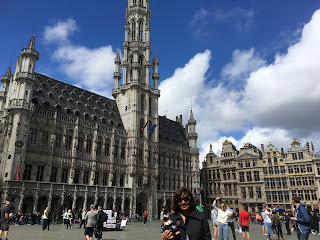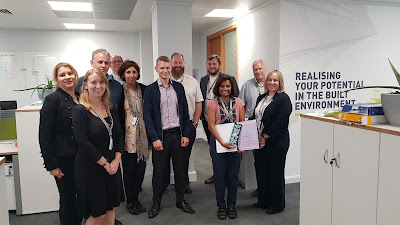It feels great to be recognised for the effort you put in
for your work. Some of the research we do, does not give the results we intend. It tells us that what we wanted is not happening or it is not
effective. But this is part of the research. There could be various reasons for
that, which I will not go into here. After all this post is to celebrate the
prestigious European Distance and E-Learning Network (EDEN) Best Research Paper Award!
 |
| EDEN19 Best Research Paper Award - photo by Ben McCammick-Copley |
When I got to know that I was one of the eight finalists out
of the shortlisted 23 papers, I was delighted to be one of the best to be
considered in the final round. Going to Bruges was my first visit to Belgium.
One of my colleagues from UCEM asked me to take a photograph with #OswaldTheOwl
if I could. So, on my way to Bruges I made it to the Grand Place to make sure I
captured a picture with Oswald.
 |
| Grand Place, Brussels |
The conference was well organised (I think I will be writing
another blog about the conference) - undoubtedly the best conference
organisation I have seen. I had the privilege to listen to two of the Best
Research Paper Award nominated presentations on Tuesday 18th June afternoon. They both were PhD research projects and the quality of the work was
very high. So I was really glad that my work had been shortlisted among those
high quality research.
At the Conference Gala Dinner, which was held at the amazing
Market Hall (first constructed in 1240!) they announced the winner of the Best Research Paper Award. The chair of the Jury said it was a unanimous
decision. This years’ theme was “Connecting through Educational Technology” and
the jury had agreed my work Automatic Transcription software: Good enough foraccessibility? A case study from Built Environment Education was well aligned
with the theme. He further said that when they critically evaluated each criterion:
- contributes convincingly to the theme(s) of the conference;
- deals with a research question of relevance for conference participants;
- rigorous examination/research methods are applied;
- findings, results and outcomes are convincingly presented and critically examined;
- conclusions are thoroughly discussed (including aspects like applicability, transferability, and/or further research);
- literature is reviewed against the state of art.
 |
| Receiving the Best Paper Award from Prof. Alan Tait |
there could be no other winner. They commended being open
and honest about my small study and being critical about the limitations of the
study. Methodology, he said, was designed so meticulously that they could not
ask for anything more. This coming from Prof. Alan Tait, a very well-respected
researcher in Distance Education and the chair of the Jury, meant a lot to me.
As researchers we continuously criticise our work to find
better ways of doing things the next time. It doesn’t help many
women suffer from Imposter Syndrome and have self-doubts. However, I think
now it is time for me to celebrate. But before that I need to thank my amazing
PhD supervisors Prof. Andrew Adams (Meiji University, Japan), Professor EmeritaShirley Williams and Prof. Naz Rassool (University of Reading, UK) for guiding
me through my PhD to make me the independent researcher I am today.
You can access the full paper and presentation.
 |
| Online Education Team Celebration at UCEM |
No comments:
Post a Comment